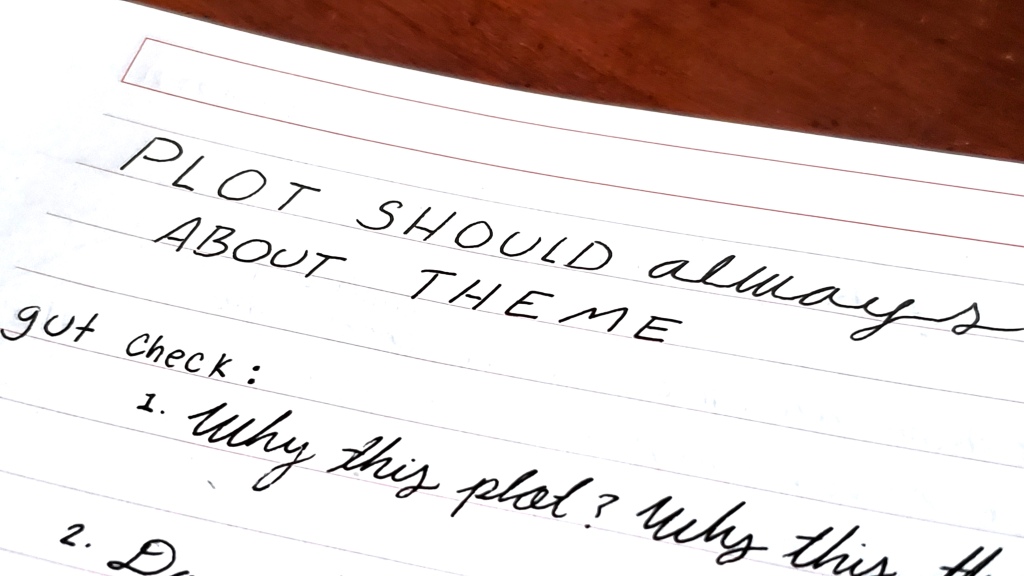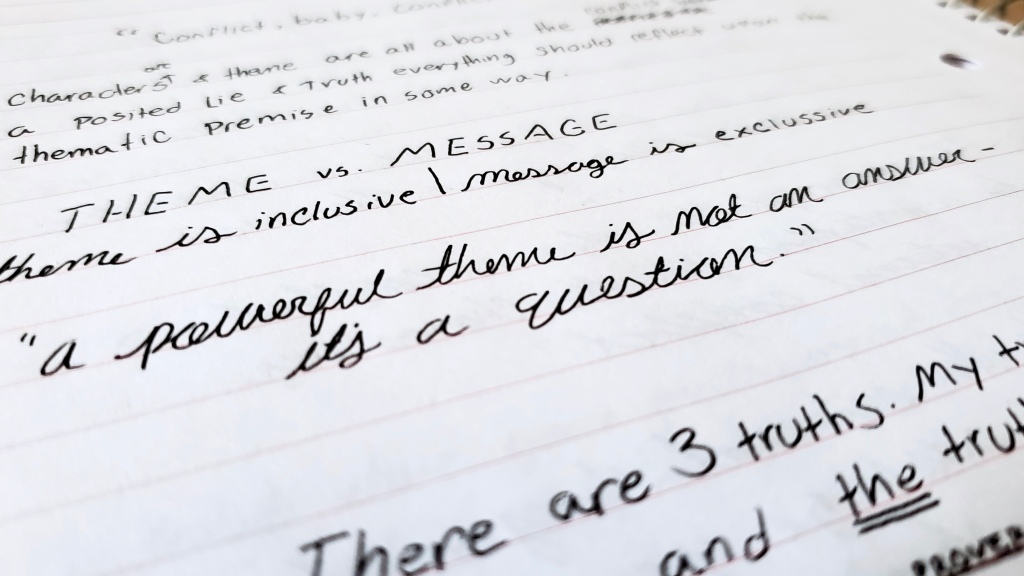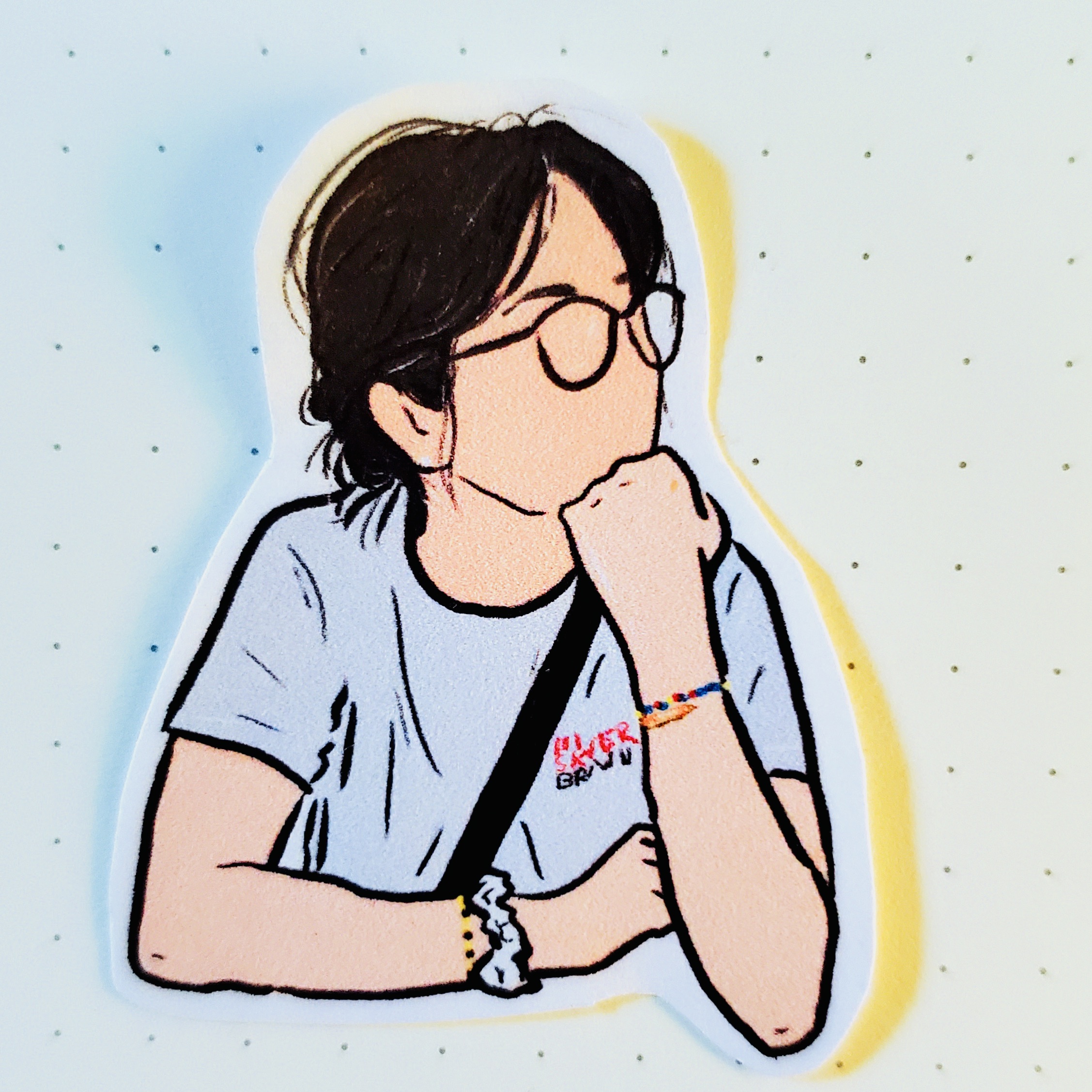Once upon a time, there was a young writer who discovered a mystical element called “theme”. The little writer learned of the great power this element held and its ability to transform story craft. The notion of “theme” did in fact seem logical but the wide-eyed little writer paid no heed. The little writer surmised that by the process of osmosis, or more accurately, diffusion, this very important element would somehow take root and settle naturally into her little writer mind. But alas, the little writer was soon met with the great big dragon called, Hogwash. This great and terrible dragon was too fierce a match for the writer and it sent her packing, all the way back to the drawing board, where she pulled out her dusty old books and began her study anew.

I hope you enjoyed that little allegory about a certain writer and her misconceptions regarding theme. And in case you had any doubts about the true identity of the little writer, well, it’s me. Theme is something I have struggled with throughout my writing journey and for a time I thought the idea of theme was even a little exaggerated. I knew theme was important and I knew every story had one, but I failed to understand how to implement theme into my own works. I had assumed that my subconscious would weave together a coherent theme into my story and things would all work out in the end. But as I was trudging deep into yet another writing project, many of the same issues began to crop up on the page as they had in most of my previous projects. I had a niggling suspicion in the back of my mind that the root of my problems was theme, or the lack thereof.

I examined all of my notes on the subject and reviewed what other writers had to say on the topic and it all began to make sense. All this time, above all else, theme had been what was hindering my writing process the most. To be honest, I think the entire notion confused me a bit. With so many technical terms and methods discussed by writers like, experiment in living, and poetic justice, not to mention, story theme, in contrast to story idea/message, my understanding became murkier and murkier. It was also a little embarrassing, since theme is reinforced so rigidly on writing advice websites, like Story Embers. I’d even read entire books discussing it.

I think I’ve finally reached a point where I can comprehend the idea in a more straightforward, if somewhat simplistic way, (which is how people like me tend to think, per K.M. Weiland’s teachings).
Theme, is the unifying subject or idea explored via recurring patterns–what ties everything together. (i.e. Power Corrupts)
Another way to think of it is by the definition of synchronicity:
The simultaneous occurrence of events that appear significantly related but have no discernible causal connection.
Theme has always been hard for me to grasp because when I first begin to work on a new story, my ideas are generally very broad. In the plotting and planning phases, my thinking tends to be too big when I should be thinking much smaller. With world building, and character arcs being developed, I find it extremely difficult to narrow my focus to the very essence of my story. I began to ask myself, if all of the scenes, and dialogue were stripped away, what would my story really be about? What message would remain? For a long time I agonized over this problem. So I tasked myself with a challenge, what if I had a clear theme in mind from the very beginning, would it change or affect my writing process? You may recall the experiment I talked about a few months ago, when I endeavored to write a first draft entirely by hand. What I didn’t mention back then was that I also used that same story to test out my new understanding of theme.

I had a few of the basics down. I had an intro, a few characters in mind, and a few names and places to begin with. But I did not yet have a theme. I was at a loss on how to condense this broad story idea into a single, cognizant message. So I did what any writer in doubt does, I went to google. I couldn’t really believe that I was scrolling through lists of generic themes to carve my story around. But to my surprise I found just what I was looking for. I found a theme that worked with my story and in fact, was exactly what I needed to fill in the gaps and join everything together seamlessly. Never had an outline come together so quickly or easily before.

At first it felt like cheating to use a theme I had found on the internet, but I realized that tons of other people probably do that as well. I don’t mean to say that google is the ultimate cheat-sheet to solve all of your problems, but I am saying that theme doesn’t have to be something so abstract or unique only to one story. There are actually a finite number of themes and truths to express in your story, but there are infinite ways to deliver them. What matters most is the way you deliver your truth.

I’ll close with a bit of advice I wish I had known a long time ago and that is, theme matters, a lot. But your theme doesn’t have to be so complicated you can’t articulate it with a few words. You can have a simple theme and still have a broad and expansive story to express it. It’s better to develop your theme before you begin your first draft, as I have learned the hard way. Also, don’t get caught up in all of the technical jargon thrown your way while you’re still figuring things out, you can worry about that stuff later. Google can be a friend, (sometimes) so don’t be afraid to use the resources at your fingertips.

I’m still trying to figure things out for myself, and just wanted to share some of my thoughts on this subject. If you’re also trying to make sense of all of these writing terms and elements, try not to worry, lots of us out here are right beside you treading those very same waters. And if you’ve already braved the rapids, perhaps you could share some of your thoughts and experiences with the rest of the class? We would all appreciate it.
Thanks for reading,
Lady S
Helpful Resources:










Leave a comment